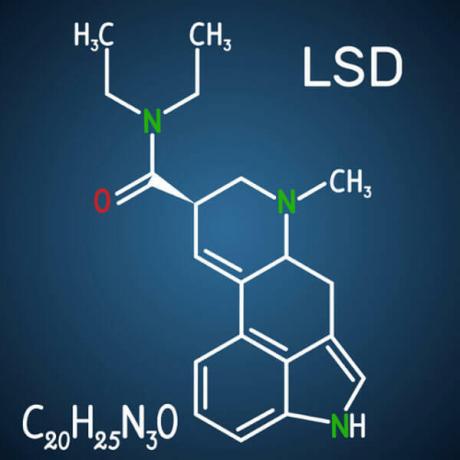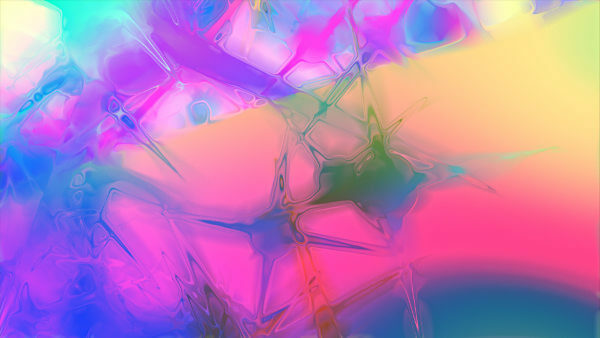O LSD (Lysergic Acid Diethylamide) is a substance, manufactured in the laboratory, very similar to those present in a fungus called Claviceps pupurea. LSD is a hallucinogenic, that is, it is a substance capable of altering the perception of the one who uses it. This change makes the user able to see, feel and hear things that are not real.
It is noteworthy that the use of hallucinogens has been observed since prehistory and is gaining increasing popularity in the contemporary world, especially among young people and adolescents. In general, this kind of damn it it is used by people of higher economic classes because of its high value. As it is an illegal drug, it is not possible to obtain data regarding the correct number of its users.
Read too: Synthetic drugs
→ How did LSD come about?
LSD is a synthetic drug, therefore it is not found that way in nature. The first to synthesize LSD was the chemical Albert Hoffman, in 1938. Initially, its objective was that LSD was used for therapeutic purposes, however, due to the effects of its use, the substance started to be used as a recreational hallucinogen.

Note the structural formula for LSD.
→ How is LSD used?
It is usually used orally, placing a small drop of liquid under the tongue. Some users, however, prefer to place the substance on a small piece of paper and then place it under their tongue. LSD is also found in sugar cubes, microdots and gelatin tablets.
LSD is a very potent drug, so small amounts are needed for it to have a great effect. It is estimated that if a person uses a dose of 50 micrograms, the effect can last up to 12 hours.
→ What does LSD cause?
LSD causes various sensations and changes in the ability to perceive. Among the main effects, we can mention: expansion in the ability to perceive colors and changes in sound reception. There may also be the call synesthesia, in which sensory information is mixed, being possible, for example, to hear a color. Furthermore, the drug causes changes in the perception of time and space. Some users believe the drug causes a spiritual uplift.

The use of LSD makes the user see more enhanced colors and have other perceptions of sounds.
Read too: Marihuana
Due to these sensations, the drug started to be used mainly in places like concerts and parties, which, supposedly, become more “fun” and “different”. It is important to emphasize, however, that the effects vary from person to person and are directly related to the doses used and the user's emotional state.
Although some sensations experienced are pleasant for some users, it is common for calls to occur bad trips. This condition causes anxiety, panic and delusions that can have serious consequences, as the person loses the ability to differentiate between what is real and what is not. In these cases, it is important to try to make the user more relaxed in order to reduce anxiety and, in this way, prevent him from hurting himself or causing harm to others.
Sometimes, the user, after using LSD several times, may develop "flashbacks", in which the observed psychic symptoms — when the user used the drug — are repeated even without the use of the substance. Researchers believe this can be triggered by alcohol and marijuana use.
Read too:Why do we like to use drugs?
In addition to the psychological effects of LSD, this drug causes some changes in the physical aspects of the body. Typically, the LSD user presents pupil dilation; increased heart rate, blood pressure and body temperature; sweating; dry mouth; tremors; loss of appetite; and insomnia. Although many people use the substance in exaggerated ways, there are no reports of overdose due to LSD or chemical dependency on this substance.
→ Complications related to using LSD
Among the main complications caused by the use of the drug, the development of psychotic pictures, which may cease quickly or last for a longer period. What will determine the severity of this problem will be the predisposition of each user. In addition, depression and an increase in the symptoms of psychological conditions already established in that person may occur. It is noteworthy that the increase in these cases is also related to the increase in the number of suicides.

The use of LSD is related to psychosis and depression.
→ Is LSD addictive?
LSD does not normally lead to addiction. Therefore, many people are able to simply stop using the drug. Withdrawal syndrome is not reported in people who have stopped using it.
However, as highlighted above, the repeated use of the drug can lead to psychotic conditions, deprivingthat's and even accentuate other psychiatric problems that the individual already has. Therefore, even if the drug is not addictive, it can have harmful consequences for the body.
→ Can LSD be marketed?
LSD has already been marketed by the pharmaceutical industry as a way to help treat anxiety, alcoholism and psychosis. However, its indiscriminate use meant that the drug was prevented from being sold. Currently, the substance is not used in the treatment of any disease, but studies are being carried out to assess its potential.
LSD is a prohibited drug, so its marketing and distribution is a crime. Unfortunately, trading is done illegally.
Read too:Harms caused by drug use
By Ma. Vanessa Sardinha dos Santos
